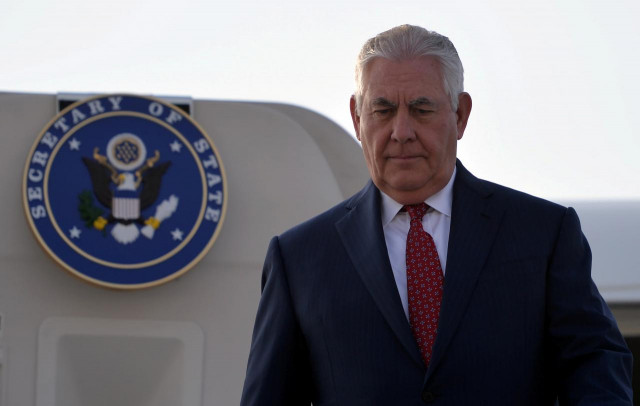For Kabul, Indo-Pak détente is key
The new US approach seeks greater and deeper cooperation with India while relegating Pakistan’s role

US Secretary of State Rex Tillerson. PHOTO: REUTERS
In his brief stay, he had only two engagements — one at the US Embassy and the other at the PM office for discussions with Pakistan’s civilian and military authorities. There was neither a news conference nor an interaction with any other public forum. In contrast, Tillerson spent a night in New Delhi and his engagements there had been wide ranging.
This is a manifestation of the new US approach that seeks greater and deeper cooperation with India while relegating Pakistan’s role. That is why the US and India are now speaking with one voice on Pakistan. Notably, the Trump administration views the problem of terrorism and extremism through the Indian prism. But why is this new US strategy flawed and a recipe for disaster not only for Pakistan and India but for the Afghan endgame?
The reason is that the Trump strategy that was supposed to bring all the regional players on the same page is in reality encouraging confrontation. The strategy which is supposed to elicit crucial Pakistani support for an Afghanistan peace deal may further increase its strategic anxieties.
Relations between Pakistan and India had already hit rock-bottom much before Trump unveiled his new strategy. And the US approach will only aggravate the tensions between the two. When the US is supposed to encourage both the neighbours to talk to each other, it is doing the opposite. It is exploiting the differences between them to further its own interests in the region.
While India blames Pakistan for sponsoring cross-border terrorism, Islamabad insists that New Delhi is fanning militancy through its secret agencies. If Pakistan is accused of using certain militant outfits as a hedge against the growing Indian footprint in Afghanistan, India is following an ‘offensive-defence’ doctrine, encouraging militant groups inimical to Pakistan. In the ultimate analysis, Afghanistan has become a new battleground for the two. Therefore, any plan on Afghanistan that excludes Indo-Pak rapprochement will be an exercise in futility. If the US was truly seeking peace in Afghanistan then it would have encouraged greater engagement between Pakistan and India first.
Instead of dealing with them separately, the US would have talked to both together. Because the détente between Islamabad and New Delhi is as important for their bilateral relations as it is for Afghanistan. However, unfortunately, the prospect of such a rapprochement seems to be a distant dream. Relations between the two countries have continued to deteriorate. Frequent border clashes, jingoistic statements and blame game are the new normal between them.
External players mainly the US has often been blamed for the perpetual Indo-Pak hostilities. Western powers said to have kept the tensions between the two alive in order to ensure that their military industrial complex never runs out of business. India is already talking to the US to acquire F-16 and F-18 fighter jets as well as armed drones. The deal is worth billions of dollars. If there was peace between Pakistan and India why would they need all the sophisticated military hardware? The US has a clear strategy: keep the region on the boil. In reality it never wants to encourage conflict-resolution, rather its emphasis is on conflict management.
But the leadership in both Pakistan and India are the main culprits allowing external forces to determine the fate of their bilateral relations. Both are victims of their false egos. The sooner they realise the better because the future of over 1.5 billion people is at stake.
Published in The Express Tribune, October 30th, 2017.
Like Opinion & Editorial on Facebook, follow @ETOpEd on Twitter to receive all updates on all our daily pieces.














COMMENTS
Comments are moderated and generally will be posted if they are on-topic and not abusive.
For more information, please see our Comments FAQ